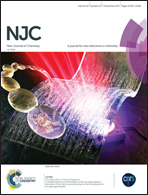Biosynthesized Pd/γ-Al2O3 catalysts for low-temperature 1,3-butadiene hydrogenation: the effect of calcination atmosphere
Abstract
Low temperature 1,3-butadiene hydrogenation over biosynthesized Pd/γ-Al2O3 catalysts annealed under different atmospheres (H2 and air) was compared in a fixed bed reactor, and the catalysts were prepared using a facile sol-immobilization method. The structural properties of the Pd/γ-Al2O3 catalysts in relation to their activities in 1,3-butadiene hydrogenation were investigated by X-ray photoelectron spectroscopy, X-ray diffraction, hydrogen temperature-programmed reduction, thermogravimetry, transmission electron microscopy, CO chemisorption measurement techniques and Fourier transform infrared spectroscopy. The results of characterization revealed that the calcination atmosphere (H2 and air) exhibited a remarkable impact on the chemical state of Pd species and catalytic activity, and the coexistence of the metallic state and oxidation state of Pd was a key factor for higher catalytic activity and butene selectivity, while the catalyst with the existence of the metallic state only (H2–Pd/γ-Al2O3) showed lower butene selectivity, and the catalyst with the oxidation state alone (air–Pd/γ-Al2O3) hardly showed any activity in 1,3-butadiene hydrogenation. Therefore, the chemical state of Pd played an important role in the 1,3-butadiene hydrogenation reaction.



 Please wait while we load your content...
Please wait while we load your content...